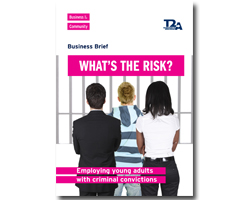Business leaders want help to employ ex offenders
New research published today calls for:
- more and better sharing of good practice among employers;
- a formal employers forum through which to promote this good practice;
- guidance on risk management to support businesses who want to employ more ex-offenders.
A new report by Business in the Community (BITC), as part of the research programme undertaken by the Transition to Adulthood Alliance, has uncovered individual businesses that are making great progress towards improving employment opportunities for young adult ex-offenders. However, business leaders feel more could be done across the sector to improve knowledge and understanding of how to minimise risks and share best practice.
The report (‘What’s the Risk? Employing Young Adults with Criminal Convictions’) consulted eight high profile UK employers including Marks and Spencers, Timpsons and Lend Lease that are pioneering successful employment schemes for groups facing barriers to work. Despite breaking new ground, they complain about a lack of adequate publicly shared information on how companies should make recruitment decisions when hiring offenders.
The government is about to respond to its consultation on the sentencing Green Paper, which called on employers to create more avenues into work for ex-offenders. BITC has identified three critical factors for success to help companies committed to reducing re-offending through employment. It encourages companies to:
- Work in partnership and share the risk – companies should work with voluntary organisations or statutory bodies responsible for young adult offenders who will better understand the barriers to employment they face. Together they can create sustainable pathways to work for these individuals.
- Provide work experience opportunities – work placements offer young adults the opportunity to prove themselves, build their confidence, and enhance their employability. At the same time it allows companies to test whether a person is suitable for employment.
- Consider the circumstances and personal journey of the individual – this includes realistically assessing risk and ensuring the company protects the individual and those with whom he/she comes into contact. Ideally only one or two colleagues should be involved in this process.
Edwina Hughes, Campaign Manager: Reducing Re-offending, Business in the Community said: “We are delighted that the Government has officially recognised the vital role employers play in reducing re-offending rates. Clearly there is a lot of excellent work already taking place amongst UK employers but at the moment these are isolated pockets of success. Businesses need encouragement and support to share their experiences on how to work safely and constructively with young adults who have been in trouble with the law.”
James Timpson, Managing Director of Timpson said: “At Timpson, we selectively recruit both men and women directly from prison. We have over 100 examples of ex offenders who have quickly become a crucial part of the shops team and have not returned to their previous criminal past. It’s great seeing their personalities come to life as their confidence grows as they learn the required skills to run a Timpson shop.”
Key statistics
- Research suggests that employment reduces re-offending by between a third and a half (Social Exclusion Unit 2002).
- Prisoners who have problems with both employment and accommodation on release from prison had a re-offending rate of 74% during the year after custody, compared to 43% for those with no problems (Ministry of Justice, 2008).
- Fewer than two in ten UK employers have knowingly employed ex-offenders. However, nine in ten state that they are open to doing so in principle. This mismatch could be due to prejudice on the part of employers, pointing to the need for programmes and incentives to influence employer behaviour (Working Links, Prejudged: Tagged for Life, 2010).
Case Study: Timpson Ltd.
Timpson, the shoe repair business, selectively recruits both men and women directly from prison. The company has over 100 examples of ex-offenders who have quickly become a crucial part of the shops team and have not returned to their previous criminal past. For the last 10 years James Timpson has been developing links with various prisons to find suitable candidates to work in their shops.
During this time the Company has forged relationships with some 30 prisons and has had over 120 ex-offenders (Foundation colleagues as they are known) pass through the doors. Timpson currently employ 87 full time Foundation employees.
Two years ago, Timpson opened a Timpson Academy in HMP Liverpool. Here, prisoners are intensively trained in all aspects of shoe and watch repairs, engraving, customer care and health & safety. There is even a mock up shop that prison staff use that creates a unique customer service opportunity.
Wandsworth Academy opened on the 10th November 2010 to recruit Foundation colleagues in the London region.
This research is strongly supported by the Leadership team of the Employers’ Forum for Reducing Re-offending which is chaired by James Timpson, CEO of Timpson Ltd.

